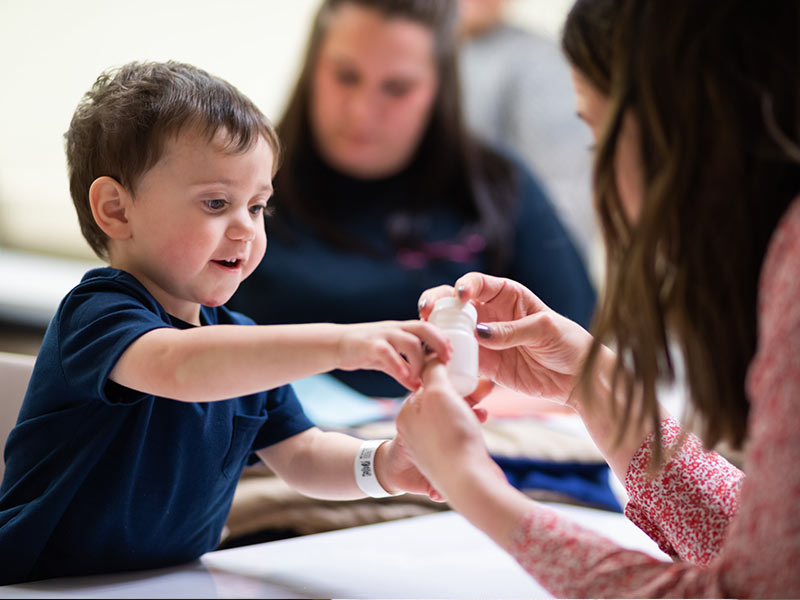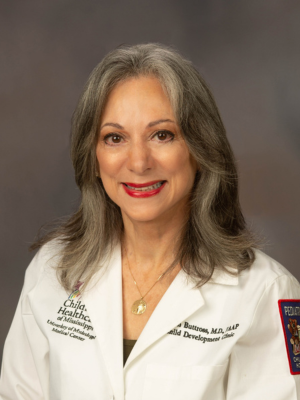Mississippi Thrive!: Most young children need developmental health care

More than half of Mississippi’s youngest children may need developmental health care services, research by Mississippi Thrive! shows.
The Mississippi Thrive! Child Health Development Project, an innovative partnership between Mississippi State University’s Social Science Research Center and the University of Mississippi Medical Center, has been working with families, child care centers and health clinics across the state to gauge the health and development of children ages 5 and younger and to link those in need to services.
About 52 percent of the 322 children whose families participated in developmental questionnaires through the Mississippi Thrive! pilot project required follow-up developmental care or monitoring, the project found.
Now entering its third year, Mississippi Thrive! is funded through a $10.5 million grant from the U.S. Health Resources and Services Administration.

Dr. Susan Buttross, professor of child development and principal investigator of the project at UMMC, said the skills young children learn are called developmental milestones, and they usually happen around certain ages. Tracking the progress of children and linking them to needed services are the major goals of this project, she said.
“We like to think of screenings as marking milestones that children pass as they grow up,” Buttross said. “As we mark those milestones, sometimes we find that a child is developing differently than expected.”
Making these discoveries early in a child’s life and getting that child and family the help needed can make a big difference in a child’s future relationships and performance in school, Buttross said.
“The sooner we identify and begin addressing a developmental or behavioral need, the better,” she said. “Early support can mean children start school ready to learn, play and share with others and can reach their full potential.”
Early childhood is key to later success, Buttross said. She explained that the brain’s weight triples in the first three years of life, and by age four, a child’s brain is almost the size of an adult’s. The architecture of the brain is then refined through learning and life experiences.
For that reason, boosting a child’s brain development during these early years is key.
“Talking and singing to your baby are the best things a parent can do to boost development,” Buttross said, “and it doesn’t cost a thing.”
Research has shown that children who have access to early learning opportunities—such as being read and sung to by their families—are better prepared for school, have increased vocabularies and have more positive relationships with classmates.
“No two children are the same,” said Lauren Elliott, a nurse practitioner with the Mississippi Thrive! team. “Each child develops at their own rate, but there are milestones that if not reached, could indicate a concern.”
While there is a clear need for marking the developmental milestones of the state’s young children, often those screenings do not occur.
In Mississippi, seven out of 10 young children have not received a professional assessment on their development, according to the 2018 Mississippi Child Health and Development Survey, conducted by Mississippi Thrive!
Nationally, one child out of five is diagnosed with some type of developmental delay, whereas the rate in Mississippi is one out of every 20.
“This lower number of children diagnosed doesn’t mean that we have lower numbers of children with developmental problems but likely that the developmental progress of many of our young children is not being regularly checked,” Buttross said.
To check for progress toward developmental milestones, professionals with expertise in child development, such as pediatricians, nurses or child care providers, can have discussions with families about their children’s development. This works best when professionals ask parents a structured set of questions focused on children’s developmental milestones, such as when a 1-year-old has said his first word or when a 2-year-old has said her first two-word phrases. Mississippi Thrive! project members are working to provide early childhood professionals with the tools and materials needed to mark children's milestones as a routine part of their practices — and to communicate the importance of developmental milestones to families.
“Mississippi Thrive! focuses on community outreach by sharing information directly with individuals and professionals,” said Callie Poole, an SSRC research associate. “We also look at the sustainability of who in the state is already sharing our message and how can we support them and share our resources.”
“By increasing the health literacy of families and early childhood professionals around the state, Mississippi Thrive! is working to ensure all children develop to their fullest potential,” said Dr. Heather Hanna, assistant research professor and principal investigator of the project at the SSRC.
Resources to check your child’s progress are available on the Mississippi Thrive! website, which includes brain-building tips from Vroom; specialized information for parents, teachers and caregivers; and developmental milestones checklists.


